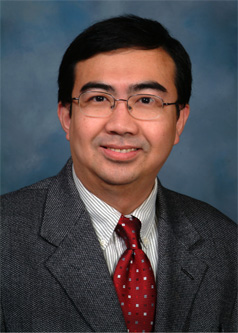 |
Pariwat Thaisetthawatkul, M.D. |
You do if you know someone with tingling, burning, numbness or weakness in their feet and/or in their hands, or someone with fainting or dizzy spells.
Pariwat Thaisetthawatkul, M.D., (pronounced hi-setta-watt-kool) would like to help people with peripheral nerve disorders by working in a clinic where individuals can get treatment. “The idea is to provide comprehensive care to patients who have peripheral neuropathy and autonomic disorders,” he said.
Dr. Thaisetthawatkul has made caring for patients with peripheral nerve disorders one of his primary goals since coming to UNMC six months ago. “So far the EMG (electromyography) lab, where a part of the diagnostic tests is done, has been established,” he said.
Two other labs – an autonomic lab and a sensory lab, to begin with – also are needed in order to provide the kind of all-inclusive care Dr. Thaisetthawatkul envisions.
Dr. Thaisetthawatkul came to UNMC after training about a year and a half at the Mayo Clinic in Rochester, Minn., in the treatment of peripheral nerve disorders, which refers to the variety of conditions that result when the nerves from the rest of the body that connect to the brain and spinal cord are damaged. Before training at the Mayo Clinic, Dr. Thaisetthawatkul spent a year in electromyography training at the University of Rochester (N.Y.) Medical Center and four years in neurology residency at Buffalo State University in New York.
Dr. Thaisetthawatkul decided to bring his expertise to UNMC when he realized no one was specializing in peripheral nerve disorders. “So many people are affected by this, that I realized I could really be of service,” he said.
There are many different kinds of peripheral neuropathy with many different causes — from carpal tunnel syndrome (chronic repetitive use of the hands and wrists) to Guillian-Barre syndrome (a rare, sudden paralysis).
Since coming to UNMC, Dr. Thaisetthawatkul has had a large number of patients suffering with peripheral nerve disorders referred to him. “I am in clinic at least three times a week seeing patients,” he said, convinced of the need for a peripheral nerve center at UNMC.
Dr. Thaisetthawatkul became fascinated with neuromuscular disease during his neurology residency. “There are so many aspects to peripheral nerve diseases,” he said. “It affects people of all ages.”
There also are different types of neuropathy, he said. For instance, people with diabetes often have neuropathy starting in the legs, while Bells palsy patients have a cranial neuropathy affecting their face. Still others might have a thoracic neuropathy affecting the chest causing pain, sensory loss and possible paralysis of the muscles.
“There are inherited neuropathies and acquired neuropathies brought on by many causes such as toxic, metabolic, infectious or neoplastic causes,” he said.
Some neuropathies can be cured, such as those brought on by certain infections or immune-mediated disorders; others cannot. However, even if some neuropathy cannot be cured, the symptoms can be controlled, he said. For example, the sensory symptoms of diabetic neuropathy can be controlled to some extent, through the use of medications, Dr. Thaisetthawatkul said.